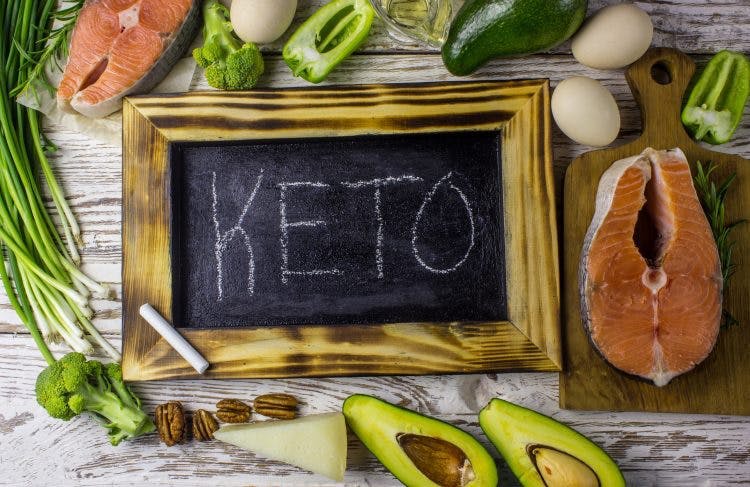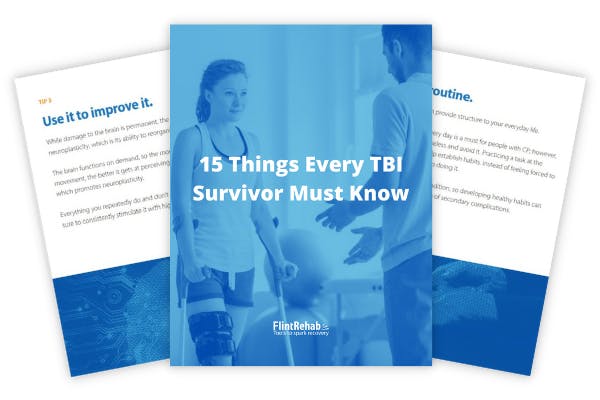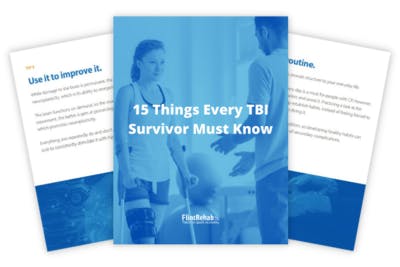No products in the cart.
No products in the cart.
No products in the cart.
No products in the cart.
Home » Neurological Recovery Blog » Traumatic Brain Injury » Ketogenic Diet for Traumatic Brain Injury: Do the Benefits Outweigh the Risks?
Last updated on February 19, 2021

Can a ketogenic diet help promote recovery after a traumatic brain injury?
The ketogenic diet is a low-carb, high-fat diet that alters your body’s main source of energy from glucose to ketones. It’s suggested that this diet has neuroprotective benefits, which may be able to promote recovery after a traumatic brain injury.
To help you determine whether the ketogenic diet is worth trying for TBI recovery, this article will discuss how it works, its benefits, and potential complications.
In a balanced diet, glucose (from carbohydrates) is the brain’s primary source of energy. However, after a traumatic brain injury, the brain may not be able to process glucose as efficiently as it did before.
A major concern in traumatic brain injury recovery is getting your brain enough energy to promote healing. This is where the ketogenic diet may be able to help!
The goal of a ketogenic diet is to encourage the body to burn fat for energy instead of sugar. To do this, the body must enter a state of ketosis by cutting off the primary source of sugar: carbohydrates.
Once ketosis is triggered, the fat your liver processes is converted into ketones, which your body can use for energy.
Because ketones are one of the few molecules that can cross the blood-brain barrier, they can serve as an alternative source of energy for the brain when its ability to metabolize glucose is disrupted.
In the following section, we’ll discuss potential benefits of following a ketogenic diet after TBI.

Currently, only animal models suggest that a ketogenic diet can provide neuroprotective benefits following a TBI. However, the results are promising.
Research shows that ketones “decrease oxidative stress, increase antioxidants, and scavenge free radicals.” These processes are essential for promoting healing of the brain.
It’s also important to understand that there are significant limitations in correlating the results from animal studies to humans. For example, rodents have lesser energy reserves and higher metabolic rates than humans. As a result, more human studies are required before concluding that a keto diet can help individuals recover from a TBI.
One benefit of a ketogenic diet that has been proven in human studies is its effectiveness at reducing seizures. This is relevant because individuals can develop epilepsy following a TBI. Ketones help stabilize neuronal activity, which can help prevent the abnormal and excessive electrical activity in the brain that causes seizures.
In the next section, we’ll discuss potential complications of following a ketogenic diet after traumatic brain injury.

Ketogenic diets are mostly safe, but some health risks and possible side effects can occur.
The following are potential complications you should be aware of before deciding to try keto.
When the body starts transitioning into ketosis, some people may experience flu-like symptoms. These can include:
This “keto flu” doesn’t happen to everyone, and typically only lasts a few days when it does. But for people with brain injury who already struggle with some of these secondary effects, it may be problematic.
Make sure to consult with your doctor before making any major dietary changes to make sure that adopting a ketogenic diet is safe for your specific condition.
Individuals with diabetes after brain injury should not follow the keto diet because they have a greater risk of developing ketoacidosis.
Ketoacidosis occurs when the body stores too many ketones and the blood becomes too acidic.
Signs and symptoms of ketoacidosis include:
If you experience any of these, you should contact your doctor right away.
Following a ketogenic diet can be intimidating because of its restrictive nature.
In order to stay in ketosis, individuals must measure their carb intake for every meal. Even healthy foods like carrots and apples are often considered too high in carbs to remain in ketosis.
When you’re recovering from a traumatic brain injury, the last thing you need is more stress. This ultimately comes down to knowing yourself and whether you’re willing to give up certain foods. If following a strict diet is not ideal for your mental health or lifestyle, do not force it.
The ketogenic diet holds a lot of promise for individuals with traumatic brain injury. However, further controlled studies on humans are necessary to confirm its efficacy.
Ketones can be a great alternative source of fuel for the brain when glucose metabolism is disrupted. Additionally, they can effectively reduce seizures, something many TBI survivors experience.
However, any major changes to your diet can cause adverse side effects, so it’s essential to discuss with your doctor whether a ketogenic diet is ideal for your specific brain injury.
We hope this article on ketogenic diets for traumatic brain injury helps you find the right nutritional approach to boost your recovery.
Photo credits: iStock/ThitareeSarmkasat/fizkes

If you like our content, you’ll love our ebook and newsletters! Get instant access to our TBI recovery tips ebook with 20 pages of helpful advice by signing up below.
You’ll also receive our emails that share survivor stories and more useful TBI recovery tips, which you can opt out of at any time. (We know you’ll love them, too.)
We will never sell your email address, and we never spam. That we promise.


Time with a speech therapist is extremely valuable during recovery, especially if you struggle with communication, critical thinking, or memory after brain injury. Insurance typically covers speech therapy for a fixed amount of time. But once it’s over, recovery is in your hands.
That’s why a team of neuroscientists and clinicians from Boston University created the CT Speech & Cognitive Therapy app. Designed for those recovering from stroke, TBI, or living with neurological conditions, the app contains over 100,000 cognitive exercises that are all available right from your phone or tablet. That’s like having a speech therapist by your side whenever you want!
This app is the perfect fit if you want to improve your speaking, memory, or general mental sharpness. And, it’s affordable at just $29.99/month!
“For the past 6 months, my son has used the app about three times a week. The app is like a virtual therapist, it’s very easy to use, and it gives him immediate feedback.
He now understands things faster, can make decisions with less hesitation, has improved recognition of words, and his confidence is higher. I also find it easy to get in touch with customer service; they pleasantly help out. The whole experience has been great.”
— Miriam
With the CT App, you can get the guidance you need right from your phone or tablet. You can use it on your own or in between sessions with your speech therapist.
Whether you struggle with aphasia, memory loss, or critical thinking, the CT Speech & Cognitive Therapy App can help.
“The CT app has helped me gather my confidence by building on and reinforcing old forgotten skills. It helps to see my percentages increase, and work harder when they decrease. It’s very self-motivating.” -Kathryn
We are confident that this app will help improve your speech and cognitive function after brain injury. Like our recovery tools, the CT App is also covered by our 30-day money-back guarantee.

Do you know these 15 TBI recovery tips?
Get a free copy of our ebook 15 Things Every TBI Survivor Must Know. Click here to get instant access.
Grab a free rehab exercise ebook!
Sign up to receive a free PDF ebook with recovery exercises for stroke, traumatic brain injury, or spinal cord injury below: